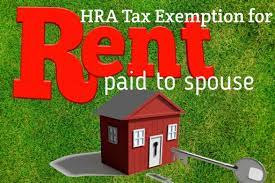House Rent Allowance tax exemption is a widely used benefit employers provide to employees to help them with their rental expenses. HRA can be claimed under Section 10(13A) of the Income Tax Act, 1961, for rent paid for accommodation, but specific guidelines and conditions must be met to avail of this exemption. One such situation pertains to claiming tax exemption for rent paid to one’s spouse, parent, or relative. In this article, we will explore this exemption’s critical aspects and its implications on taxpayers and their tax liabilities.
Understanding House Rent Allowance (HRA) Tax Exemption
House Rent Allowance is a component of an individual’s salary the employer provides to help cover the cost of renting a house. It is partially exempted from income tax, subject to certain conditions laid down by the Income Tax Act. The HRA tax exemption is available to salaried and self-employed individuals who pay rent for their accommodation.

To claim the HRA tax exemption, the taxpayer must fulfil the following criteria:
1. Salaried Individual: Only salaried individuals who receive HRA as a part of their salary package can claim this exemption. Self-employed individuals are not eligible for the HRA tax benefit.
2. Rent Payment: The taxpayer must incur rental expenses for a residential accommodation they occupy.
3. Own Residence: Taxpayers cannot claim HRA if they live in a house they own. House Rent Allowance tax exemption is only applicable when renting a home.
4. PAN of Landlord: If the annual rent paid by the taxpayer exceeds Rs. 1,00,000, it is mandatory to provide the Permanent Account Number (PAN) of the landlord to the employer.
Rent Paid to Spouse, Parent, or Relative
As per the Income Tax Act, they are claiming HRA tax exemption for rent paid to a spouse, parent, or relative is not allowed under certain circumstances. This rule is implemented to prevent tax evasion by individuals declaring rental payments to close family members and claiming tax benefits without a genuine rental arrangement.
1. Spouse: Rent paid to a spouse is not eligible for HRA tax exemption. The Income Tax Department considers the spouse as an immediate family member and deems the rental arrangement as a way to transfer funds within the family.
2. Parent: Rent paid to parents is also not eligible for House Rent Allowance tax exemption. While it may be a genuine arrangement, the tax authorities often view it as an attempt to reduce the individual’s tax liability without any actual rental expense.
3. Relative: Per the Income Tax Act, relatives include siblings, aunts, uncles, cousins, and in-laws. Rent paid to these relatives is not eligible for HRA tax exemption due to the inherent family relationship.
Exceptions and Special Cases
There are a few exceptions to the rule of not claiming tax exemption for rent paid to relatives:
1. Genuine Commercial Rental: If the taxpayer can provide valid evidence that the rental arrangement with the relative is genuinely commercial and the property is used for business purposes, the tax authorities may consider granting the HRA tax exemption.
2. Separate Ownership: If the taxpayer’s spouse, parent, or relative owns the property and the rental arrangement is genuinely independent of the taxpayer’s relationship, then HRA tax exemption may be considered.
Conclusion
House Rent Allowance (HRA) tax exemption is a valuable benefit provided to employees to ease their financial burden of renting a house. While the exemption allows taxpayers to claim tax benefits on their rental expenses, certain conditions must be met. Notably, claiming HRA tax exemption for rent paid to a spouse, parent, or relative is generally not permitted. Taxpayers must exercise caution and ensure that their rental arrangements are genuine, with proper documentation and adherence to the rules set forth by the Income Tax Act, to avoid any potential tax-related issues or penalties. It is advisable to seek professional advice from a tax consultant or chartered accountant to navigate the complexities of tax exemption and ensure compliance with the tax laws.